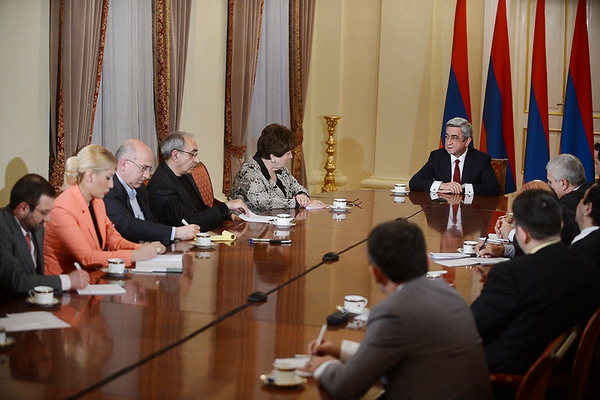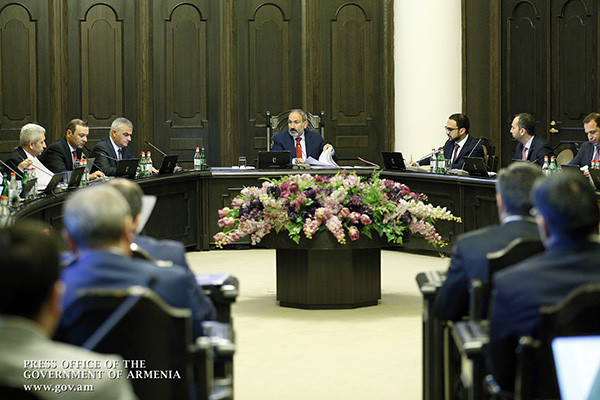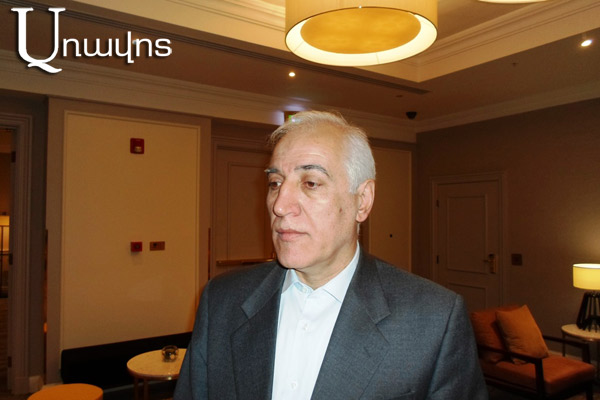“I cannot give you an answer right now that the whole composition of the Cabinet will be changed. My answer is the following; I don’t see any reasons for radical changes as yet, but it doesn’t mean that the Cabinet members are guaranteed against such changes or I give them certain privileges,” President Serzh Sargsyan stated at a press conference. He explained it by the fact that our country’s economic growth was 7.2% in 2012, whereas the economy of the European Union grew by 0.2%. Therefore, what moral right does he have to summon that Cabinet and dismiss it? S. Sargsyan asked who would guarantee that the new people would do it better. Andranik Tevanyan, the director of Political Economy, a research institute, agreed with this claim of the president during a conversation with www.aravot.am and went into detail: “As far as his presidency is concerned, it is not important who will be in the Cabinet, since the real demands he makes regarding the economic policy have nothing whatsoever to do with the ones he announces. Ministers will keep their offices, the Prime Minister will keep his within the scope of building a one-oligarch economy, and naturally, he doesn’t have a task of changing or not changing. If Serzh Sargsyan states that he has no legal right to change a cabinet ensuring a 7% growth, then what moral right was there to keep a cabinet that ensured a 14.4% decline in drams and a 30% decline in dollars? Whereas
it had been promised that it would be 9 percent. This Cabinet hasn’t kept any promise that was made in the 2007 program and after the 2008 presidential election. Basically he asserted in that regard that what he wants is concentration of the economy; Tigran Sargsyan solves the problem of redistribution of business. It is just that S. Sargsyan said that he would do it slowly, whereas the young oligarchy wants to privatize everything quickly. However, at the end of the day, it reminds of a Neo-Bolshevik or a Türkmenbaşy economic system. T. Sargsyan solves those issues; that is why he doesn’t have a task of changing. To Serzh Sargsyan, he is a natural, since he carries out all the instructions of the Presidential Palace.” A. Tevanyan doesn’t expect changes from the president, regardless of what will change in terms of persons. “S. Sargsyan said that one should change the policy, not persons, but there is no concept of political changes. At the end of the day, this government has no mission. Power for power.” A. Tevanyan stated that S. Sargsyan had found himself in Chernenko’s position; he had become a symbol of the rotten system that had neither potential nor desire for any positive changes anymore. He added that they were just settling a palace dispute; the son-in-law, the heir, wanted the presidential system to be maintained, so that he could inherit it afterwards, and S. Sargsyan wanted to solve the issue of self-reproduction. Coming back to the president’s press conference, A. Tevanyan called it “the phoniest press conference ever” and went into detail: “There has been no other case in our modern history when a broad press conference is shot by one camera, and the recording is not shown to anyone and is presented to society only after editing. Such a phony press conference happens only in North Korea.”
Armenak Chatinyan, an economic commentator of Civilnet, in his turn, noted that a 7% economic growth looks nice only on paper. He urged to go into it and understand how material it was. “Has the standard of living of our citizens improved as a result of that 7.2% economic growth? One can ensure a 10%-15% growth on paper, but the poverty rate in your country is still 35%, there is no swift decline in unemployment rate, and there is no swift increase in jobs. Therefore, that 7.2% is just mechanical work with numbers. The professionals of the economic cluster in the government are quite smart, but the president has given a wooden rifle to the government and says shoot. The Cabinet’s activities are basically restricted at the political level. That is why the reforms are slow. In my opinion, there will be no radical changes; the Prime Minister will remain in office, along with the economic cluster. If there is political will, this Cabinet can implement radical reforms.”
Tatev HARUTYUNYAN






















































